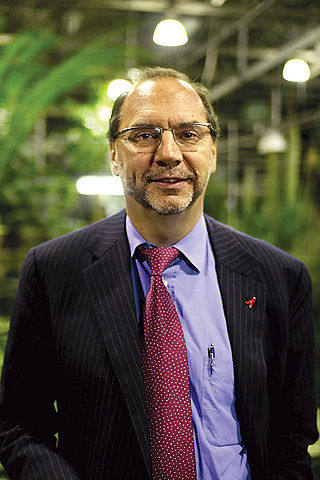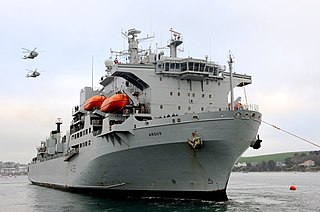
Sir Peter Karel, Baron Piot, is a Belgian-British microbiologist known for his research into Ebola and AIDS.

Sir David Nunes Nabarro is a Special Envoy on Covid-19 for the World Health Organization. He has made his career in the international civil service, working for either the Secretary-General of the United Nations or the Director-General of the World Health Organization. Since February 2020, he has helped the DGWHO deal with the COVID-19 pandemic.
The NATO Medal is an international military decoration which is awarded to various militaries of the world under the authority of the North Atlantic Treaty Organization (NATO). It is manufactured by Eekelers-Centini Intl, of Hemiksem, Belgium.

The Operational Service Medal for Afghanistan is a campaign medal previously awarded by the Ministry of Defence of the United Kingdom for service by British Armed Forces personnel in support of the post-2001 Afghan War.

The 2013–2016 epidemic of Ebola virus disease, centered in Western Africa, was the most widespread outbreak of the disease in history. It caused major loss of life and socioeconomic disruption in the region, mainly in Guinea, Liberia and Sierra Leone. The first cases were recorded in Guinea in December 2013; later, the disease spread to neighbouring Liberia and Sierra Leone, with minor outbreaks occurring in Nigeria and Mali. Secondary infections of medical workers occurred in the United States and Spain. In addition, isolated cases were recorded in Senegal, the United Kingdom and Italy. The number of cases peaked in October 2014 and then began to decline gradually, following the commitment of substantial international resources.

An Ebola virus epidemic in Sierra Leone occurred in 2014, along with the neighbouring countries of Guinea and Liberia. At the time it was discovered, it was thought that Ebola virus was not endemic to Sierra Leone or to the West African region and that the epidemic represented the first time the virus was discovered there. However, US researchers pointed to lab samples used for Lassa fever testing to suggest that Ebola had been in Sierra Leone as early as 2006.

An epidemic of Ebola virus disease in Guinea from 2013 to 2016 represents the first ever outbreak of Ebola in a West African country. Previous outbreaks have been confined to several countries in Sub-Saharan Africa.

An epidemic of Ebola virus disease occurred in Liberia from 2014 to 2015, along with the neighbouring countries of Guinea and Sierra Leone. The first cases of virus were reported by late March 2014. The Ebola virus, a biosafety level four pathogen, is an RNA virus discovered in 1976.

Organizations from around the world responded to the West African Ebola virus epidemic. In July 2014, the World Health Organization (WHO) convened an emergency meeting with health ministers from eleven countries and announced collaboration on a strategy to co-ordinate technical support to combat the epidemic. In August, they declared the outbreak an international public health emergency and published a roadmap to guide and coordinate the international response to the outbreak, aiming to stop ongoing Ebola transmission worldwide within 6–9 months. In September, the United Nations Security Council declared the Ebola virus outbreak in the West Africa subregion a "threat to international peace and security" and unanimously adopted a resolution urging UN member states to provide more resources to fight the outbreak; the WHO stated that the cost for combating the epidemic will be a minimum of $1 billion.

The Ebola virus epidemic in West Africa has had a large effect on the culture of most of the West African countries. In most instances, the effect is a rather negative one as it has disrupted many Africans’ traditional norms and practices. For instance, many West African communities rely on traditional healers and witch doctors, who use herbal remedies, massage, chant and witchcraft to cure just about any ailment. Therefore, it is difficult for West Africans to adapt to foreign medical practices. Specifically, West African resistance to Western medicine is prominent in the region, which calls for severe distrust of Western and modern medical personnel and practices.(see Ebola conspiracies below.)
United Nations Ebola Response Fund is a special fund set up by the United Nations Foundation to allow donations to support U.N. institutions to respond to the Ebola virus epidemic in West Africa. The U.N. has received other money for Ebola, but the fund is more flexible in how it can be spent. The U.N. announced the fund on 12 September 2014.

Operation Gritrock was the code name given to the British, Irish and Canadian participation in the fight against the Ebola virus epidemic in West Africa. In November 2015, Sierra Leone was officially declared Ebola free. More than 50 members of British Army's 5 Armoured Medical Regiment were presented with operational medals for their duties in Sierra Leone during the crisis. Members of the Irish Army Medical Corps were awarded the International Operational Service Medal by the Irish government.

Ebola virus disease in the United Kingdom has occurred rarely in four cases to date, namely three health workers returning from treating victims of the Ebola virus epidemic in West Africa in 2014 and 2015, and a single case in 1976, when a laboratory technician contracted the disease in a needlestick injury while handling samples from Africa. All cases recovered. As of 2022, no domestic transmission of Ebola has occurred in the United Kingdom.

In late October 2014, the United Kingdom sent a hospital ship, the Royal Fleet Auxiliary's Argus, to help the aid effort against the Ebola virus disease epidemic in Sierra Leone. By late October Sierra Leone was experiencing more than twenty deaths a day from Ebola.

Cases of the Ebola virus disease in Nigeria were reported in 2014 as a small part of the epidemic of Ebola virus disease which originated in Guinea that represented the first outbreak of the disease in a West African country. Previous outbreaks had been confined to countries in Central Africa.

In March 2014, the World Health Organization (WHO) reported a major Ebola outbreak in Guinea, a western African nation, the disease then rapidly spread to the neighboring countries of Liberia and Sierra Leone with smaller outbreaks occurring in Senegal, Nigeria, and Mali; the resulting West African Ebola virus epidemic is the largest Ebola outbreak ever documented.
The International Operational Service Medal is a military decoration awarded by the Government of Ireland to personnel of the Irish Defence Forces who have been deployed on overseas missions by direction of the Government where no other mission medal has been awarded. It was first awarded in October 2016.

Sir Christopher John MacRae Whitty is a British epidemiologist, serving as Chief Medical Officer for England and Chief Medical Adviser to the UK Government since 2019.

Michael Joseph Ryan is an Irish epidemiologist and former trauma surgeon, specialising in infectious disease and public health. He is executive director of the World Health Organization's Health Emergencies Programme, leading the team responsible for the international containment and treatment of COVID-19. Ryan has held leadership positions and has worked on various outbreak response teams in the field to eradicate the spread of diseases including bacillary dysentery, cholera, Crimean–Congo hemorrhagic fever, Ebola, Marburg virus disease, measles, meningitis, relapsing fever, Rift Valley fever, SARS, and Shigellosis.
The Humanitarian Medal is a British award intended to recognise the efforts of those involved in providing aid and support to human welfare during or in the aftermath of a humanitarian crisis. The medal is awarded to people that have responded to emergencies both in the United Kingdom or overseas.
















